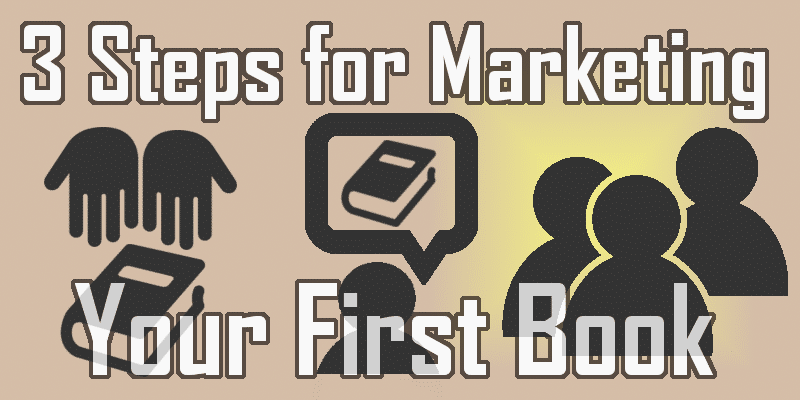
3 Steps for Marketing Your First Book
The subject of marketing your first book came up again recently, and for some reason people are looking for my opinion on it. Wait … I’ve published how many books now? Well, carry on, then. I guess I’m not quite new at this anymore.
This isn’t a cure-all, a shortcut, or a guarantee of success. This is a place to start. I’m going to assume you’ve already written the best book you know how, and published it through one or more major online retailers (Amazon + any others). For the sake of argument, let’s say you’ve just reached the Frustration stage of my “5 Stages of Self-Publication.”
Step 1: Put Your Book in People’s Hands
When I say “put,” this isn’t the sort of transaction that’s going to involve money. You need to give your book to people, with the subtle undertone that you’d sort of like them to review it when they’re done. You can do this the old-fashioned way and talk to people you know, or introduce yourself to people you don’t (expect a low success rate if you haven’t run into the person in a reader/book/topically-related context). You can also use free days on Amazon KDP, if you’re enrolled, or a Goodreads giveaway if you have a print version. Poke around in forums appropriate to your genre or subject matter, and offer you book there as well (preferably sites you’re already associated with … there’s groundwork to be done for these sorts of things. “What about all the sales I’m losing?” you might ask. You’re not losing sales any more than a farmer loses a harvest by planting seeds. No one knows your work, and no one is looking for it. If found, it will most often be dismissed out of hand in favor of a known quantity. You need to overcome this, by brute force if necessary.
Step 2: Convert Readers Into Reviewers
In an ideal world, your book is likable and engaging, the sort of book people will recommend to others. Through a strange phenomenon known as “I never thought of that,” most people don’t review books they’ve read. Hopefully, the end of your book contains this suggestion, but many people will gloss over it, forget, or just not care. So, if you happen to encounter anyone who mentions reading one of your books …
- Thank them
- Ask if they left a review
Whether it’s Goodreads or Amazon (the two main repositories of reader ratings and reviews), try to get them to offer their opinion of your book publicly. Some readers are shy (even online, in text, with little or no personal exposure), or think that their opinion isn’t important. I covered this in How to Write a Book Review, and the short answer is: anyone who finished the book is qualified to review it, and yes, their opinion does matter. WARNING: Don’t badger people. Some will agree to review your book just to shut you up on the topic, or because that’s what they think you want to hear. They probably won’t get around to it. Others will just be naturally forgetful. In either case, ask once and let it drop. SUGGESTION: If you run a Goodreads giveaway, after you send the books out, give it a few weeks and check in with the winners. Goodreads users are more inclined than most readers to leave reviews.
Step 3: Turn Readers Into Fans
Eventually, the end of any one of your books will contain a link to buy the next in a series, or the first book of a new series. But never the most recent book you’ve written (for Time Travel Paradox-related reasons), and obviously not your first book ever. Your last book should have a link to your mailing list. This is where readers can keep up with your work, and hopefully remember that you exist by the time the next book comes out (reminder: no one knows who you are yet). If you don’t have a list, start one. MailChimp is a fine place to start. You can use your mailing list to …
- Tell readers when a new book comes out (preferably a little in advance)
- Offer special deals when your book is on sale (or free). This can help spread your book as they recommend it to friends, or pick up books they haven’t gotten to yet
- Share updates on your writing status or blog (if you have a blog … if not, consider starting one)
- Put the call out to readers for things like beta reading
I used #4 just recently for the first book in my new Black Ocean series, and got a great response rate (and some great feedback) from the readers on my mailing list. One thing to keep in mind is that these are your readers (and possibly your blog’s readers). You don’t want to pester them, since they already know about your work. This is a symbiotic relationship, not a feeding tube for your promotions. Offer things a reader would want, whether it’s writing-related content, new books, etc. Don’t try to hard sell them on reading your book(s). Most of them already have.

0 Comments